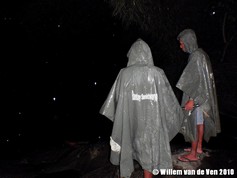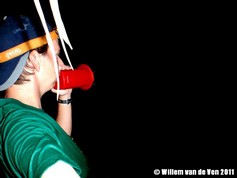
 From 2011 to 2015, Lacoste will support the Mabuwaya Foundation through the Save Your Logo.
From 2011 to 2015, Lacoste will support the Mabuwaya Foundation through the Save Your Logo.
The project will reward rural communities for conserving the species in the wild. Every year the Mabuwaya Foundation will count the number of Philippine crocodiles in the wild in cooperation with local wardens and forest guards of the Department of Environment and Natural Resources (DENR). Based on these participatory counts the village will receive a cash donation for every Philippine crocodile that survives in their village: a clear and direct incentive for rural communities to protect crocodiles. This money can be used for local development priorities (like painting the school, organizing the annual fiesta, bringing a sick person to the hospital, etc.). Above all the payment is recognition of people’s efforts to protect the critically endangered Philippine crocodile in the wild.
In Filipino the project is called 4Bs: Barya para Bayan Bantayan Buwaya
The project has 3 objectives:
1. Monitor the Philippine crocodile population in the northern Sierra Madre.
2. Provide a direct payment to rural communities based on the number of crocodiles surviving in the wild.
3. Mobilize broad public support by disseminating information on Philippine crocodile conservation to rural communities and local governments
The project has the following activities:
1. Participatory monitoring of the Philippine crocodile population: every year the project will monitor the Philippine crocodile population in the northern Sierra Madre in cooperation with DENR and rural communities. The crocodile specialist will spend 3 nights in every site and conduct spotlight night surveys and daylight track surveys to count crocodiles in cooperation with 2 DENR forest guards and 4 local wardens (Bantay Sanktuwaryo). In addition the survey team will document land use changes and assess threats using the national Biodiversity Monitoring System (BMS) methodology.
2. Crocodile reward: the Mabuwaya Foundation will pay PhP. 1,000 per crocodile surviving in the wild to the barangay development fund based on the results of the annual participatory monitoring.
3. Community dialogues: the results of the annual participatory monitoring program will be discussed with the community. The crocodile reward will be ceremonially handed over to the barangay officials in the presence of the entire community to be deposited in the Village Development Fund. Specific solutions will be formulated to mitigate the threats to the Philippine crocodiles. During the meetings the community organizer will also lecture about legislation protecting crocodiles in the wild.
4. Training: at the start of the project a training workshop will be organized for DENR forest guards and the local wardens to practice monitoring skills. The training will take place in the Disulap River Philippine Crocodile Sanctuary. The community organizer and crocodile specialist will facilitate the training and invite national specialists.
5. Workshop DENR: 2 workshops will be held with DENR officials (from national, regional, provincial and district level) to disseminate information and secure support. One meeting will be held at the start of the project (2011) and one mid-term (2014). The community organizer will facilitate these meetings and will provide annual updates to the DENR.
6. Workshops LGUs: 2 workshops (2011 & 2014) will be held in the 4 municipalities were the Philippine crocodile occurs (Maconacon, Divilacan, Palanan and San Mariano) to disseminate information on the Philippine crocodile population and secure continued support. The community organizer will facilitate these meetings and provide annual updates to the LGUs.
7. Workshops Provincial Government: 2 workshops (2011 & 2014) will be held with the provincial governor to disseminate information and secure financial support. The community organizer will facilitate these meetings and provide annual updates to the Provincial Government.
8. Presentations PAMB: every year the results of the annual monitoring program will be presented to the Protected Area Management Board of the Northern Sierra Madre Natural Park by the community organizer. This will keep regional policymakers informed on the progress of the project.
9. Creation Philippine crocodile conservation fund: an endowment fund will be established to secure the continuity of the Philippine crocodile conservation program after 2015. Potential donors (government, corporations, individuals) will be approached to donate to the Philippine crocodile conservation fund.
The pilot project will facilitate a recovery of the Philippine crocodile in the wild. The aim is to have 200 non-hatchling crocodiles in the wild in 2015 in the northern Sierra Madre. In addition the project will raise awareness on the plight of the Philippine crocodile and actively engage rural communities and local governments in conservation action by providing a financial incentive. The project will also provide accurate information on the population status of the Philippine crocodile in and around the Northern Sierra Madre Natural Park, which will be disseminated to partners (DENR, LGUs, provincial government) and published in the IUCN Crocodile Specialist Group newsletter and relevant (academic) journals. The project will aim to secure the financial continuity of crocodile conservation efforts in the northern Sierra Madre.

Projects
4Cs: Cash for Communities Conserving Crocodiles
 Communication and Education
Communication and Education


